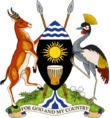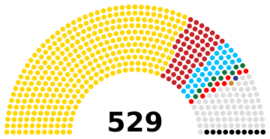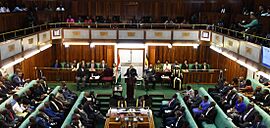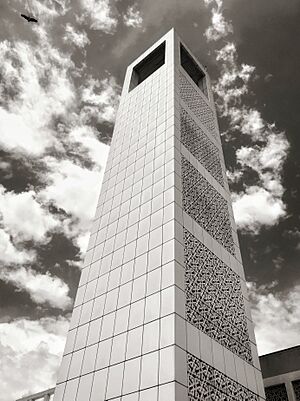Parliament of Uganda facts for kids
Quick facts for kids Parliament of UgandaBunge la Uganda |
|
|---|---|
| Eleventh Parliament | |
 |
|
| Type | |
| Type | |
| History | |
| Founded | 1962 |
| Preceded by | Legislative Council |
|
New session started
|
24 May 2021 |
| Leadership | |
|
Speaker
|
Anita Among, NRM
Since 25 March 2022 |
|
Deputy Speaker
|
Thomas Tayebwa, NRM
Since 25 March 2022 |
|
Robinah Nabbanja, NRM
Since 21 June 2021 |
|
|
Government Chief Whip
|
Denis Obua, NRM
Since 16 August 2022 |
|
Leader of the Opposition
|
Joel Ssenyonyi, NUP
Since 9 January 2024 |
|
Chief Opposition Whip
|
John Nambeshe, NUP
Since 24 May 2021 |
| Structure | |
| Seats | 529 |
 |
|
|
Political groups
|
Government (336)
Opposition (109)
Others (84)
|
|
Length of term
|
5 years |
| Elections | |
| Parallel voting: First-past-the-post voting (499 seats) Indirect election (30 seats) |
|
|
Last election
|
14 January 2021 |
|
Next election
|
12 January 2026 |
| Meeting place | |
 |
|
| Parliament Avenue, Kampala | |
| Constitution | |
| Constitution of Uganda | |

The Parliament of Uganda is the main law-making body for the country of Uganda. It is a unicameral legislature, meaning it has only one chamber or house. One of its most important jobs is to create and pass laws that help Uganda run smoothly. Government ministers must explain their actions to the people's representatives in Parliament. These ministers can also be chosen from among the members of Parliament.
Through different committees, Parliament checks on government plans, especially those mentioned by the president in the State of the Nation address. Important money matters, like taxes and loans, need Parliament's approval after discussions. Parliament also has the power to confirm certain people chosen by the president for important jobs. They can even ask a minister to resign through a special vote called a motion of censure.
Contents
- How Parliament Members Are Chosen
- A Look at Parliament's Past
- The First Parliament (1962–1963)
- The Second Parliament (1963–1971)
- The Third Parliament (1979–1980)
- The Fourth Parliament (1980–1985)
- The Fifth Parliament (1986–1996)
- The Sixth Parliament (1996–2001)
- The Seventh Parliament (2001–2006)
- The Eighth Parliament (2006–2011)
- The Ninth Parliament (2011–2016)
- The Tenth Parliament (2016–2021)
- The Eleventh Parliament (2021–Present)
- Laws Made in Uganda
- See also
How Parliament Members Are Chosen
The 11th Parliament (which serves from 2021 to 2026) has 557 members. Most members are elected directly by the people.
Electing Representatives
- Constituency Representatives: 353 members are chosen using a system called "first-past-the-post voting." This means that in each area (called a constituency), the person who gets the most votes wins the seat.
- Women Representatives: 146 seats are set aside for women, with one woman elected from each district using the same "first-past-the-post" method.
Special Representatives
- Indirectly Elected Members: 30 members are chosen in a different way, by special groups. These include:
- 10 members from the army.
- 5 members representing young people.
- 5 members representing elders.
- 5 members representing workers' unions.
- 5 members representing people with disabilities.
- Ex Officio Members: There are also 28 members who are part of Parliament because of another job they hold in the government. These are called Ex Officio Members.
- In each of these special groups, at least one woman must be elected. For the army group, at least two women must be chosen.
A Look at Parliament's Past
The Parliament of Uganda was first created in 1962, shortly after Uganda became an independent country.
The First Parliament (1962–1963)
This first Parliament was known as the National Assembly. It had 92 members. The person in charge, called the Speaker, was Sir John Bowes Griffin, a British lawyer.
The Second Parliament (1963–1971)
During this time, Prime Minister Milton Obote changed the country's constitution and became President in 1966. This Parliament also saw Uganda's traditional kingdoms ended and the country declared a republic. The Speaker for this period was Narendra M. Patel. This Parliament ended when Idi Amin took over the government in January 1971.
The Third Parliament (1979–1980)
After Idi Amin's government was overthrown in April 1979, a new law-making body was formed, called the Uganda Legislative Council. It started with 30 members, but later grew to 120. This was the Third Parliament, led by Edward Rugumayo. It continued until the general elections in December 1980.
The Fourth Parliament (1980–1985)
This period marked the return of Milton Obote and his party, the Uganda People's Congress (UPC), after the 1980 elections. The Speaker of the Fourth Parliament was Francis Butagira. This Parliament ended when General Basilio Olara Okello overthrew Obote's government in 1985.
The Fifth Parliament (1986–1996)
This Parliament was known as the National Resistance Council (NRC). It was formed after the Ugandan Bush War (1980–1986) ended. It began with 38 members from the National Resistance Movement and National Resistance Army. Over time, more representatives from across the country joined. Yoweri Museveni was the Speaker during this Parliament, and he was also the President of Uganda at the same time.
The Sixth Parliament (1996–2001)
The Sixth Parliament was formed when one political party, the NRM, was in power. James Wapakhabulo was the Speaker from 1996 to 1998. After him, Francis Ayume served as Speaker from 1998 to 2001.
The Seventh Parliament (2001–2006)
Edward Ssekandi was the Speaker of the Seventh Parliament. One of the most discussed laws passed during this time was a change to the constitution that removed limits on how many terms a president could serve.
The Eighth Parliament (2006–2011)
This Parliament continued with Edward Ssekandi as Speaker and Rebecca Kadaga as Deputy Speaker.
The Ninth Parliament (2011–2016)
Rebecca Kadaga was the Speaker of the Ninth Parliament, and Jacob Oulanyah was the Deputy Speaker.
The Tenth Parliament (2016–2021)
In the Tenth Parliament, Rebecca Kadaga and Jacob Oulanyah continued in their roles as Speaker and Deputy Speaker.
A Notable Event in 2017
On September 27, 2017, a disagreement happened during a Parliament meeting. The members were discussing a law to remove the age limit of 75 for the president from the Ugandan constitution. After the Speaker accused some lawmakers of not following the rules, a physical altercation occurred. Some members were later removed by security officers.
The Eleventh Parliament (2021–Present)
On March 25, 2022, Thomas Tayebwa was chosen as the new Deputy Speaker of the Parliament of Uganda.
Laws Made in Uganda
The Parliament of Uganda passes many laws. Here are a few examples:
- A change to the constitution that removed limits on how many terms a president could serve.
- The Employment Act, 2006, which is about jobs and workers' rights.
- The Anti-Homosexuality Act, 2014.
- The Anti-Homosexuality Act, 2023.
The Uganda Legal Information Institute (ULII) shares Uganda's laws, so people can read them for free online.
See also
 In Spanish: Parlamento de Uganda para niños
In Spanish: Parlamento de Uganda para niños
- List of legislatures by country
- List of speakers of the Parliament of Uganda
- Apollo Ofwono
- Politics of Uganda
 | Percy Lavon Julian |
 | Katherine Johnson |
 | George Washington Carver |
 | Annie Easley |


